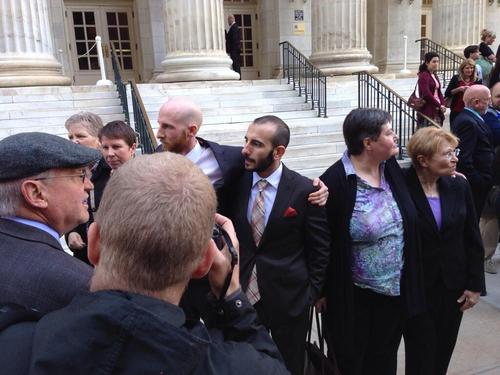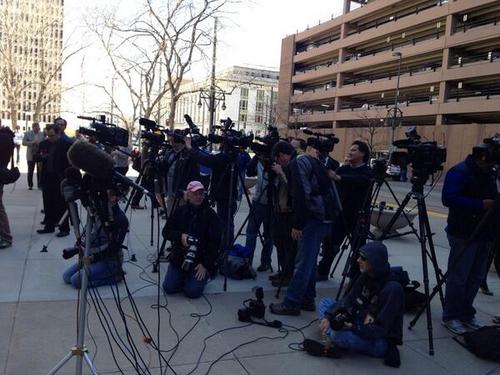This is an archived article that was published on sltrib.com in 2014, and information in the article may be outdated. It is provided only for personal research purposes and may not be reprinted.
Denver • During Thursday morning arguments before the 10th Circuit Court of Appeals — regarding Utah's ban on same-sex marriage — the judges appeared split on the issue.
There were pointed questions from the three judges — Paul J. Kelly Jr., Carlos F. Lucero and Jerome A. Holmes — about studies, jurisdiction and standard of scrutiny.
In the end, Judge Kelly appeared squarely on the side of the state, while Lucero voiced strong concerns with the law's impact on children and couples married elsewhere.
That could leave Holmes as the swing vote in the case, which was taken under advisement.
Most questions came from judges Holmes and Lucero. But Kelly asked the plaintiffs' attorney hard questions about state authority.
The judges also focused on harm to children of same-sex couples and couples married out of state.
Holmes, who is African American, asked how this is different from the Loving case, which in 1967 ended the ban on interracial marriage. Holmes suggested the same-sex ban also creates a second class of people.
Attorneys on each side had 30 minutes to press their best points before the three-judge panel, with Peggy A. Tomsic asking the judges to ensure marriage equality for all and Gene C. Schaerr asking them to preserve marriage rights only for opposite-sex couples.
The state argued that children benefit from being parented by a mother and father, not two mothers or two fathers.
U.S. District Court Judge Robert J. Shelby ruled in December that the ban is unconstitutional, and eight other federal district court judges have come to the same conclusion since then. But the 10th Circuit is the first appellate court to weigh in on the same-sex marriage dispute since last summer's U.S. Supreme Court decision in U.S. v. Windsor, which struck down a section of the federal Defense of Marriage Act.
The case could have repercussions for similar bans in 32 other states.
The state has framed its defense of Amendment 3, the constitutional ban approved by Utah voters in 2004, around the idea of what's best for children. But on the eve of the hearing, the state distanced itself from research by Mark Regnerus of the University of Texas, which is highlighted in briefs it filed with the court to bolster its claim that opposite-sex parenting is the "gold" standard for children.
Schaerr said the state wanted to emphasize the "limited relevance" of Regnerus' work to Utah's central claims about why it is necessary to ban same-sex marriage.
"The state's principal concern is the potential long-term impact of a redefinition of marriage on the children of heterosexual parents," Schaerr said in a letter filed Wednesday evening. "The debate over man-woman versus same-sex parenting has little if any bearing on that issue, given that being raised in a same-sex household would normally not be one of the alternatives available to children of heterosexual parents."
Schaerr then acknowledged what many social science researchers and a federal judge in Michigan recently concluded: due to flawed methodology, the study "cannot be viewed as conclusively establishing that raising a child in a same-sex household produces outcomes that are inferior to those produced by man-woman parenting arrangements."
Tomsic also argues that the case is about family: couples who want to provide for and protect each other legally, and children who are demeaned and humiliated when their parents are unable to marry and provide them with the benefits and protections associated with the civil institution.
The court has prepared an overflow room to handle the crowds expected for the hearing. But anticipation is already running high.
Hundreds of people, mostly Coloradans, gathered outside the courthouse Wednesday evening in a show of support for the Utah plaintiffs — Derek Kitchen and Moudi Sbeity; Karen Archer and Kate Call; and Laurie Wood and Kody Partridge.
David and Deanna Hirsch of Denver attended the rally with their daughter.
"We just celebrated our 13th wedding anniversary and I can't imagine that we should be the only ones to have that right," Deanna Hirsch said. "Everyone should have the right to celebrate their anniversaries, to create the family they want. We wanted to bring our daughter to teach her that value, that everyone has the right to love whomever they want to love."
But residents of the 10th Circuit's home state aren't the only ones keeping close tabs on the Utah case. Appeals are pending in four other circuit courts and whatever the 10th Circuit — which is also hearing an appeal from Oklahoma on April 17 — decides may influence how those judges view their cases.
The Tribune will continue to update this story through the day.





